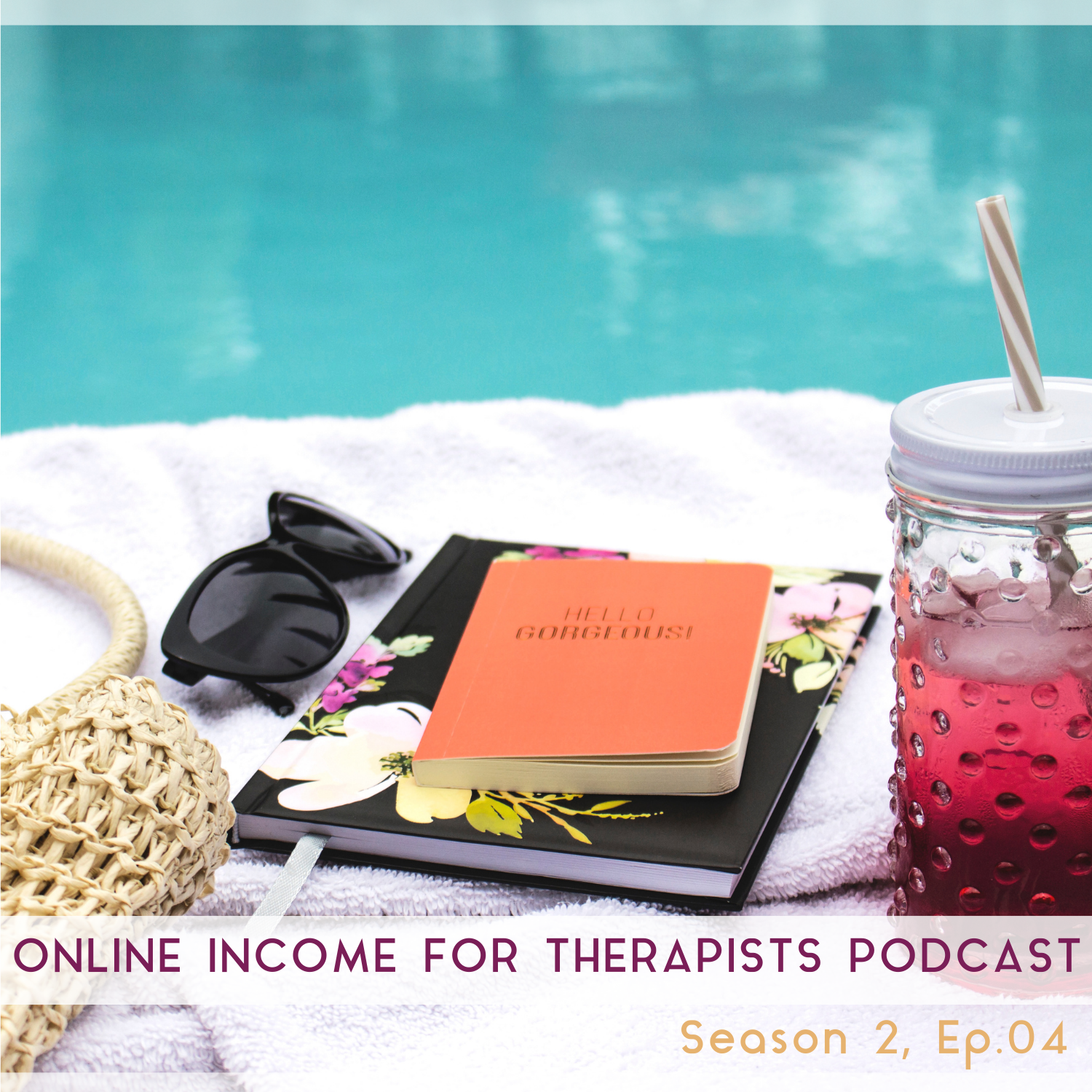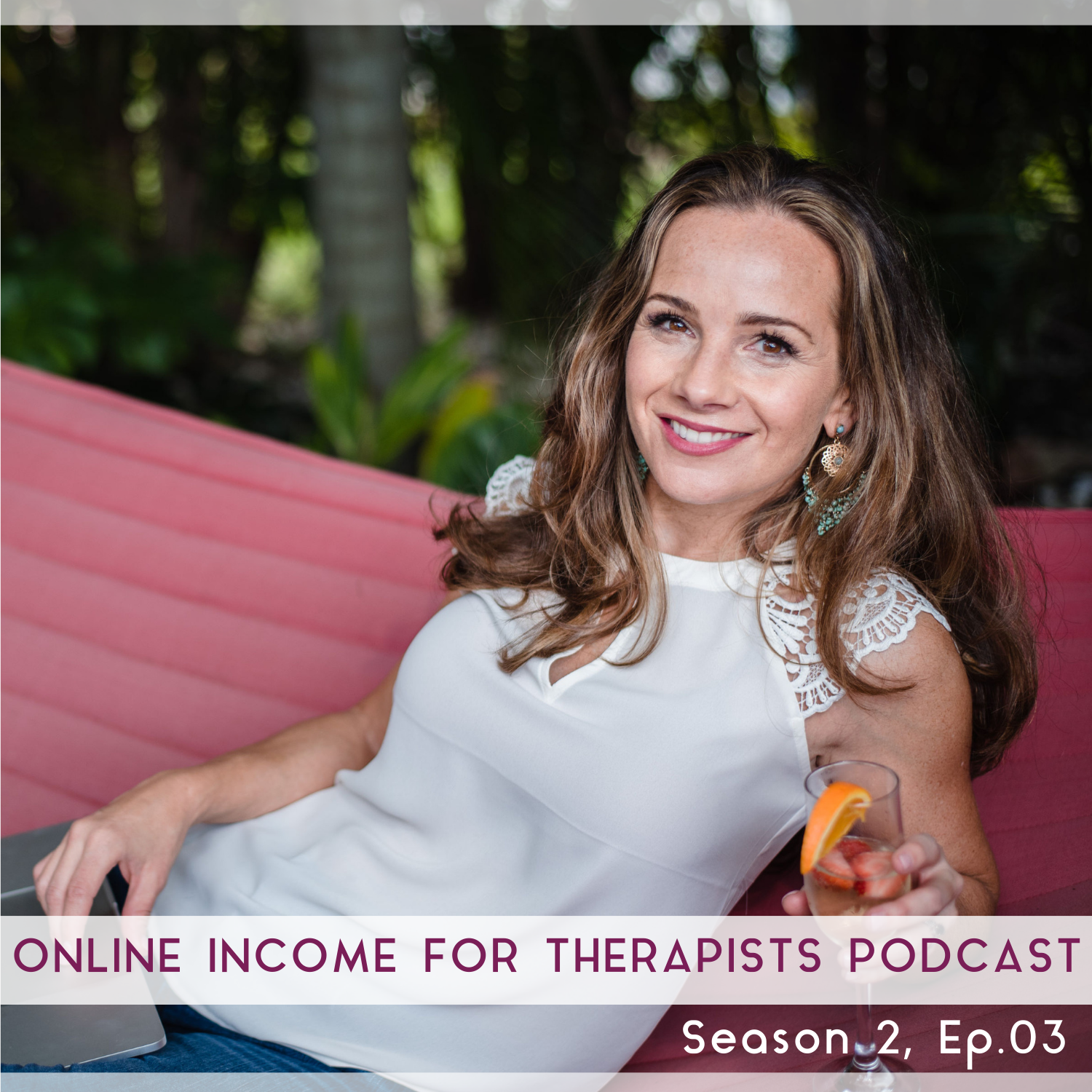Season 2, Episode 4: How to Respond when Potential Therapy Clients Say They Can't Afford Your Rate
Subscribe and never miss an episode!
iTunes | Spotify | Stitcher | Google Podcasts Overcast | Castbox | Pandora | Amazon Music Podcast Addict | Podchaser | Pocket Casts Deezer | Listen Notes | PlayerFM | Podcast Index Castro | PodFriend
Welcome to the online income for therapists podcast!
what this episode is all about
You want to start getting some private pay clients or maybe move more of your clients to private pay, but you're just not sure how to deal with your client or potential clients reaction to your rate. So, let's get started and teach you how to deal with any pushback that you might get from potential clients about your rate.
Want to Follow Along…
01:19
So, I talk about a quote that I read in Brene Brown's book Atlas Atlast of the heart, and it's actually from someone named Prentis Hemphill and it says, "boundaries are the distance at which I can love you and me simultaneously." And I feel like that's a really helpful quote in thinking about how to hold the line on your private pay rates when you experience any kind of pushback. And I'm going to talk to you about how you can do that ethically and compassionately right now.
01:49
And when you have clients pushback about your rate they're usually coming from one of two places, "I can't afford that," or, "I won't pay for that." I'm going to break each one of those into three segments: "Yes, I can afford it and I will pay for it," "No, I truly can't afford it," or "No, I really don't see the value in it. I'm not going to pay for it." Or, "maybe." With my own therapist, when I first said, "I can't afford that rate," that wasn't true, but I didn't know it until I had been invited by him to go and do the math. So your potential client, too, might have what my therapist called a sticker shock reaction and have that feeling, "I mean, I can't afford that," when in fact, yes, they might be able to. Then the kind of mid position is maybe they can afford that rate, they just had the sticker shock, right? And then the last is no, they really can't afford that, that's just going to put them in a compromised position and I have that conversation overtly with my clients. "Listen, you're already stressed out, things are not easy right now, that's part of why you're seeking therapy, the last thing I want to do is have you come into therapy and it'd be such a financial burden, that it is adding more stress to your life then it's alleviating, so I'd much rather have you get connected with a therapist who is a match for you in all the ways we were a match and also as a match for you financially. So, let's talk about how to do that." So that's how I would have that conversation. I absolutely don't want to be adding to someone's burden.
03:17
Now a sneaky little trick that I teach my students inside of Step by Step, inside of Marketing Your Online Practice, is the pause. So after you say your rate, sometimes, if you're like me, what you immediately want to say is, "but I can I can slide that fee, I could give you a discount, we could do a package rate," you know, I can immediately coming up with all these answers to a problem they haven't even said yet. And so I always teach folks use the pause. The way that I teach you to put your rate into the conversation of the free consult creates a nice opportunity for a pause automatically. And in that pause you just friggin wait. So, we've listed a bunch of things, including the rate and then say, "Do you have any questions about that?" Keep your mouth shut and wait to see what they say. It is crazy to me and to the people that I teach how often they have nothing to say about the rate. We make assumptions, because we might not be able to afford that rate yet, that they also can't or we make assumptions that other people don't find therapy valuable, when in fact, they really do. So, don't put your assumptions into the pause. Create the pause, allow them to have their response and that gives you more information too to know where to go next.
04:31
So, again, they might say, "Yeah, I can't afford that." And I might have a direct conversation about like, is that a sticker shock kind of reaction and we should talk about it more? Or is that like, "Hey, girl, I've done the math. There's no way that I can do that. And that would not be healthy for me." And I'll literally say that and then we can have a conversation about it.
04:51
Now the next one is, "I won't pay that for therapy." Now in this one, what's being said is I don't value the therapy for that money. That doesn't mean they don't value you, it doesn't mean that they don't value therapy, but it may mean that the percentage of their income that would have to go to therapy given what they're making, it's doesn't make sense to pay more for them for therapy than they're paying for their mortgage, for example, right? Like, it might just be math. It might not have anything to do with you, might not have anything to do with their value around therapy, it might just have to do with the math of what percentage of their income that would be and we want to be sensitive to that. So, sometimes when they're saying I won't, it's not that they can't find the money, but literally, it would be like their car and their mortgage payment, and that and then they can't fund their retirement, right? You know, that might not be the situation that they want to walk into, in which case, I feel mad respect that they know the math and I'm like, "Okay, I totally get it." And so I might say, if they say like, "I'm not paying that for therapy." I might say, "I had the exact same response to my own therapist. So I feel you, can you tell me a little bit more about that because I can help you find somebody that's a better match financially. And then I get to hear clinically what's going on for them. Now, it might be just a like, "Whoa, I didn't even know people paid that for therapy kind of reaction." And I've had that too. And I've had that with clients who, potential clients, who had a big reaction, like, "oh, my gosh, that's a lot of money and that's gonna be $800 a month on a four week month." And I'm like, "yeah, it's a it's an investment, it's an investment. And I think we have to figure out whether it's an investment that makes sense for you. Not that it's worth for you. But it makes sense for you." And this person shocked me because they're in different tax bracket than I am. And I'm going to de identify just in case, you know, so I'm gonna change the details a little bit, but they were like, you know, I spend that much money on XYZ a month and I don't even blink at it, I just hadn't thought about it as what I would pay for therapy. And honestly, this 20 minute consultation has been so helpful that obviously, it's going to be worth it, my marriage is on the rocks, obviously I care more about that than most other things so if I can spend the money over here, then I can spend the money over here. Then there are also those folks who aren't looking for a lot out of therapy. So maybe they're looking for more of like a phone a friend kind of situation and they're not going to want to pay $250 a week for a phone a friend situation, they're willing to pay a copay of $20 a week, but that's it. And that's fine, we can be totally respectful about what is valuable to them. The important piece here is that we're having the conversation. So we create the pause, so that we can give them some room and then we have the conversation. So if somebody says to me, like, "I'm not paying that for therapy," that's not the end of the conversation. I'm gonna laugh a little bit, I'm gonna relate a little bit, and I'm gonna say, "tell me more about what you're thinking so I know exactly where you're coming from and there might help you get connected with somebody who's a better match." And I would say probably 5 times out of 10, after that conversation, they ended up matched with me. So, just have the conversation. And if they say, "I can't afford that," be sure in either case that it's not a coercive conversation, but it's a genuinely open, "I want to help you, I'm not just trying to fill my practice, I just want to help you figure out what's going to be best for you and I know I can't meet everybody's needs. Not with my skill set, not with my fee, not with my personality, like I not going to be the best match for everybody. I might be the first or third person you've called. So tell me all the things tell me what you're thinking about the fee, how much feels like you could reasonably pay and in a healthful way, it's not going to overly stress you out, but also is, sort of matches what you think the work is worth for your life and then let's see who we can find that's a good match for that." So we remove the ego out of the situation and we just come from a service-based place.
09:00
Okay, I hope that was helpful, my friends. Let me know what you might want to hear from me next, likely about marketing, or if you're looking for online income outside of therapy, we can talk about that as well. Hope you have a beautiful day. Bye.
access to all the things
★ Be the first to know about “Marketing that Works: Full Fee, Private Pay, Online or In-Office,” a guided experience and course just for therapists by jumping on the waitlist!
→ https://www.onlinetherapistgroup.com/marketingguidedexperience
★ Checkout my YouTube Channel for Additional Support!
→ https://www.youtube.com/channel/UCJ6SueI3KMQIkJ7UctIRvjg/
★ Learn more about the different ways we can connect and I can help support you in building your online therapy practice (and additional income outside of therapy)! Just hop on over here and…
Grab some freebies
Get on waitlists for upcoming offers
Gain support
Book a session with me
Download my informed consent
Learn more about coaching
And so much more…I got you!
→ https://www.onlinetherapistgroup.com/connectwithamber
★ Grab your FREE “Get It Going Checklist” to start building your online therapy practice!
→ https://www.onlinetherapistgroup.com/checklist
AND...don’t forget to join us in our FREE Private Facebook Group!
→ https://www.facebook.com/groups/138663903332494
To learn more about iTherapy, CLICK HERE! If you join, use coupon code OMHO and receive 50% off your first month!












